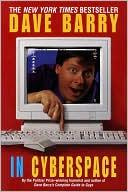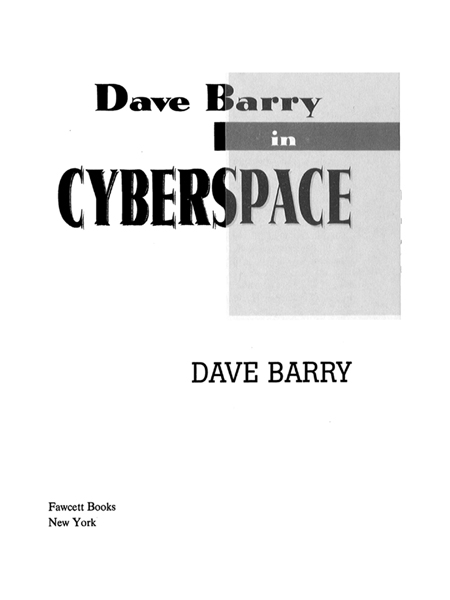SIDE-SPLITTING, MEGABYTE-SIZE HUMOR.
St. Petersburg Times
Something funny is going on in Cyberspace, and is just the guy to tell us about it.
Atlanta Journal & Constitution
The latest in Barrys bestselling string of often riotously funny humor books. It proves that even geeks can get hopelessly lost in cyberspace, and he gives the rest of us a roadmap.
The Cleveland Plain Dealer
If you dont love it youre in a distinct minority.
Booklist
Pointed and funny A natural topic for a prize-winning humorist.
Kirkus Reviews
Nonstop humor Whether youre a computer whiz or a computer nerd, this tongue-in-cheek guide to computing by bestselling humorist Dave Barry has enough byte to keep you entertained.
Publishers Weekly
Hilariously imaginative.
Library Journal
ALSO BY DAVE BARRY
The Taming of the Screw
Babies and Other Hazards of Sex
Stay Fit and Healthy Until Youre Dead
Claw Your Way to the Top
Bad Habits
Dave Barrys Guide to Marriage and/or Sex
Homes and Other Black Holes
Dave Barrys Greatest Hits
Dave Barry Turns 40
Dave Barrys Only Travel Guide Youll Ever Need
Dave Barry Talks Back
Dave Barry Does Japan
Dave Barry Is Not Making This Up
Dave Barrys Complete Guide to Guys
Dave Barrys Gift Guide to End All Gift Guides
Dave Barrys Book of Bad Songs
Dave Barry Is from Mars and Venus
Dave Barry Turns 50
Big Trouble
Dave Barry Is Not Taking This Sitting Down
Dave Barry Hits Below the Beltway
A Fawcett Book
Published by The Random House Publishing Group
Copyright 1996 by Dave Barry
All rights reserved under International and Pan-American Copyright Conventions. Published in the United States by Fawcett Books, an imprint of The Random House Publishing Group, a division of Random House, Inc., New York, and simultaneously in Canada by Random House of Canada Limited, Toronto.
Fawcett is a registered trademark and the Fawcett colophon is a trademark of Random House, Inc.
www.ballantinebooks.com
Library of Congress Catalog Card Number: 97-90891
eISBN: 978-0-307-75868-2
This edition published by arrangement with Crown Publishers, Inc.
First Ballantine Books Edition: October 1997
v3.1
For Hoobert and MsPtato
With special thanks to Crow
CONTENTS
Chapter 1: A Brief History of Computing from
Cave Walls to Windows 95
Not That This Is Necessarily Progress
Chapter 3: How to Buy and Set Up a Computer
Step One: Get Valium
Chapter 4: Becoming Computer Literate
Or: Words for Nerds
Chapter 5: Comdex
Nerdstock in the Desert
Or:Bill Gates Is Elvis
Chapter 6: Software
Making Your Computer Come Alive So It Can Attack You
Chapter 7: How to Install Software
A 12-Step Program
Chapter 8: Word Processing
How to Press an Enormous Number of Keys Without Ever Actually Writing Anything
Or: If God Had Wanted Us to Be Concise, He Wouldnt Have Given Us So Many Fonts
Chapter 9: The Internet
Transforming Society and Shaping the Future, Through Chat
Or: Watch What You Write, Mr. Chuckletrousers Or: Why Suck Is OK, Blow Is Not
Plus: Danger! Sushi Tapeworms!
Chapter 10: Using Internet Shorthand
How You Can Be Just as Original as Everybody Else
Chapter 11: Selected Web Sites
At Last: Proof That Civilization Is Doomed
Chapter 12: MsPtato and RayAdverb
A Story of Love On-line
Chapter 13: Conclusion
The Future of the Computer Revolution
Or: Fun with Mister Johnson
Chapter 14: Reprise
MsPtato and RayAdverb
INTRODUCTION
Y ou need to know right off the bat that Im a total computer geek. I am pathetic. Youve seen all those computer magazines with names like Data Dweeb and cover headlines like:
INSIDE:
EXPLICIT COLOR PHOTOGRAPHS
OF BIG HARD DRIVES!
or:
WAX YOUR MODEM FOR IMPROVED SPEED!
No doubt youve asked yourself, What kind of no-life loser actually reads these magazines?
I do! All the time! I read them in bed! I look at the pictures of new computer systems and become moderately aroused and say things like Whoa! Check out the 6X SCSI-2 CD-ROM drive on THAT baby!
dating back to the early 1980s, when I got one of the first primitive Radio Shack models, which looked like a mutant toaster oven that had been exposed to atomic radiation and developed a keyboard.
This computer had virtually no practical use other than to consume electricity. You know how modern personal computers contain a microchip brain that, despite being no larger than a Chiclet, can perform millions of mathematical calculations per second? Well, I dont think my Radio Shack computer had one of those. I think there might have been an actual Chiclet in there, calling the shots. Because this frankly was not a gifted computer. I would not have put my money on this computer in a head-to-head IQ test against a doorknob.
I had two programs for my Radio Shack: a word processor and a game where you were a spaceship commander, trying to destroy invading alien spaceships. In terms of enhancing my personal productivity, there was essentially no difference between these two programs. Both were very difficult to get working; both frequently stopped working for no apparent reason; and both had insanely obscure instructions that were written neither by nor for human beings. (To delete a word, you must first enter the Command Mode by pressing the slash key, followed by the percent key, followed by the key with that little squiggly thing, followed by the first five digits of your Social Security number, followed by ) It was impossible to use these programs for more than a few minutes without seriously screwing up and losing an important document or (even worse) your spaceship.
But I loved that computer. I spent many happy hours cursing at it. I even learned to program it a little bit. At one point I spent hours writing a simple program that made the computer count. When I ran the program, numbers would appear on the screen in sequence, like this:

and so on, until the Chiclet pooped out. I ran this program over and over. I was proud of myself for developing this innovative way to utilize my data-processing resources to do my counting for me automatically, thereby freeing me to devote my valuable time to the important task of shopping for a new computer.
Of course today I have a far more powerful computer containing numerous important computer things such as megahertzes and megs of RAM, and I use it for many vital tasks other than counting. For example, I am writing this book on a computer that is running the hugely popular Windows 95 operating system, which has revolutionized the software world thanks to its capability of accomplishing the seemingly impossible task of making Bill Gates even richer than he already was.













